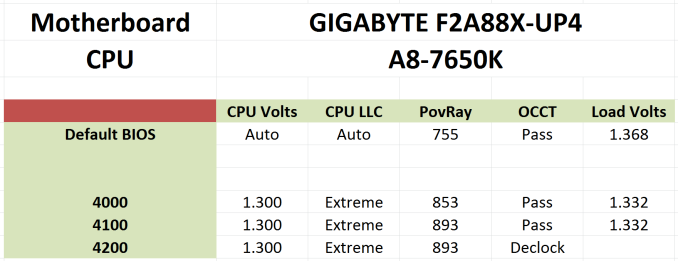The AMD A8-7650K APU Review, Also New Testing Methodology
by Ian Cutress on May 12, 2015 10:00 AM ESTTest Setup
| Test Setup | |
| Processor | AMD A8-7650K 2 Modules, 4 Threads 3.3 GHz Base, 3.7 GHz Turbo 95W, MSRP $105 |
| Motherboard | GIGABYTE F2A88X-UP4 |
| DRAM | G.Skill RipjawsZ 4x4GB DDR3-2133 9-11-10 |
| Low End GPU | Integrated ASUS R7 240 2GB DDR3 Dual Graphics with R7 240 |
| Mid Range GPU | MSI R9 285 Gaming 2GB MSI GTX 770 Lightning 2GB |
| High End GPU | MSI R9 290X Gaming LE 4GB ASUS GTX 980 Strix 4GB |
| Power Supply | OCZ 1250W Gold |
| Storage Drive | Crucial MX200 1TB |
| Operating System | Windows 7.1 64-bit, Build 7601 |
| CPU Cooler | Cooler Master Nepton 140XL CLC |
Many thanks to...
We must thank the following companies for kindly providing hardware for our test bed:
Thank you to AMD for providing us with the R9 290X 4GB GPUs.
Thank you to ASUS for providing us with GTX 980 Strix GPUs and the R7 240 DDR3 GPU.
Thank you to ASRock and ASUS for providing us with some IO testing kit.
Thank you to Cooler Master for providing us with Nepton 140XL CLCs.
Thank you to Corsair for providing us with an AX1200i PSU.
Thank you to Crucial for providing us with MX200 SSDs.
Thank you to G.Skill and Corsair for providing us with memory.
Thank you to MSI for providing us with the GTX 770 Lightning GPUs.
Thank you to OCZ for providing us with PSUs.
Thank you to Rosewill for providing us with PSUs and RK-9100 keyboards.
AMD A8-7650K Overclocking
Methodology
Our standard overclocking methodology is as follows. We select the automatic overclock options and test for stability with PovRay and OCCT to simulate high-end workloads. These stability tests aim to catch any immediate causes for memory or CPU errors.
For manual overclocks, based on the information gathered from previous testing, starts off at a nominal voltage and CPU multiplier, and the multiplier is increased until the stability tests are failed. The CPU voltage is increased gradually until the stability tests are passed, and the process repeated until the motherboard reduces the multiplier automatically (due to safety protocol) or the CPU temperature reaches a stupidly high level (100ºC+). Our test bed is not in a case, which should push overclocks higher with fresher (cooler) air.
Overclock Results
The base frequency of the A8-7650K goes up to 3.7 GHz in the highest turbo mode, and we were able to jump right into 4.0 GHz without much problem. That being said, our sample did not move much above that, giving 4.1 GHz but at 4.2 GHz we noticed that the CPU frequency would decrease during sustained workloads, resulting in a zero performance increase overall.











177 Comments
View All Comments
nikaldro - Wednesday, May 13, 2015 - link
And you still haven't got what he meantyannigr2 - Wednesday, May 13, 2015 - link
Tell me about it.nikaldro - Thursday, May 14, 2015 - link
Not sure if trolling,but anyway.They said "no comments" to express great disppointment.
As in " nothing to say about the poor performance. the numbers speak for themselves".
nikaldro - Thursday, May 14, 2015 - link
They said "no comments" as in "I have nothing to say about the poor performance of this APU. The number's speak for themselves."It had nothing to do with the actual number of comments.
nikaldro - Thursday, May 14, 2015 - link
*numbers, not number's. Damn autocorrectkrabboss - Saturday, May 23, 2015 - link
No, not really. They would have said "no comment" if that was the case, instead of "no comments."They're saying that AMD is in a sorry state these days because nobody is bothering to comment on a review of their new APU. They probably didn't realise the article had just been published, though.
redraider89 - Tuesday, May 19, 2015 - link
Stupid comments. That states Sejong's comments.YuLeven - Tuesday, May 12, 2015 - link
Only outplays Intel's offerings when it comes to the somewhat irrelevant onboard gaming market. Usually barely matches the Core i3 performance sucking thrice the power. Not really impressed by this piece of silicon.nightbringer57 - Tuesday, May 12, 2015 - link
May be irrelevant to you.May not be as irrelevant to many.
Where the performances of the core i3 may shine much brighter on paper, this may not be the case of the typical daily use of the typical daily computer for facebook, youtube, netflix, and some gaming on a tight budget.
takeship - Tuesday, May 12, 2015 - link
Could we get a benchmark or two from the broadwell nuc line included? Comparing a released today Amd against Intel's year+ old igp's is a little disappointing.